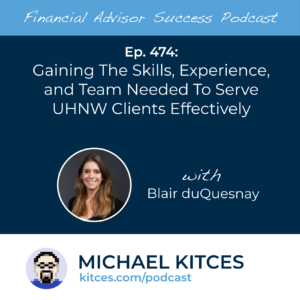 Welcome everyone! Welcome to the 475th episode of the Financial Advisor Success Podcast!
Welcome everyone! Welcome to the 475th episode of the Financial Advisor Success Podcast!
My guest on today's podcast is Erik Brenner. Erik is the CEO of Hilltop Wealth and Tax Solutions, an RIA based in Mishawaka, Indiana, that oversees approximately $600 million in assets under management for 830 client households.
What's unique about Erik, though, is how he has doubled his AUM in the past three years in part by offering a deeper level of tax-related services, including preparing client tax returns through an associated business and by working with an external firm for expertise on more complicated client tax situations.
In this episode, we talk in-depth about how Erik decided to partner with a CPA, creating a separate tax business alongside his wealth management firm (with both under one brand umbrella), how Erik takes a three-pronged approach to tax planning by having advisors leverage tools such as Holistiplan and Income Lab on the wealth management side, using the CPAs from the tax business to review proposed planning strategies, and working with an outsourced provider for expertise on more complex tax planning issues, and how Erik offers tax return preparation not as a loss leader for his wealth management services but rather as a profitable line of business in its own right.
We also talk about how Erik's firm brings in almost half of its new clients through in-person dinner seminars where the team demonstrates its expertise in the key issues facing their ideal clients (such as reducing their tax bill in retirement), how Erik uses a service that sends sufficient mailings to ensure a full room at each seminar (saving his firm the time it would take to market these events as well), and how Erik generates new client revenue from these events that exceeds the cost of holding them in the clients' first year alone.
And be certain to listen to the end, where Erik shares how he takes a two-pronged approach to generating online reviews, using both Google Reviews (which helps with the firm's search engine optimization) and Amplify Reviews (which appear on the firm's website), how Erik invites all clients to leave reviews then uses email automation software ActiveCampaign to track responses to ensure clients aren't asked to do so after they've already left one, and how Erik has ultimately found success not only by offering a deeper level of tax planning for his clients, but also by developing his leadership skills to manage a growing firm and help his team grow their careers as well.
So, whether you're interested in learning about taking a multi-tiered approach to providing tax planning services to clients, partnering with a CPA to offer tax return preparation and a deeper level of tax planning, or how to boost the number of online reviews your firm receives, then we hope you enjoy this episode of the Financial Advisor Success podcast, with Erik Brenner.









